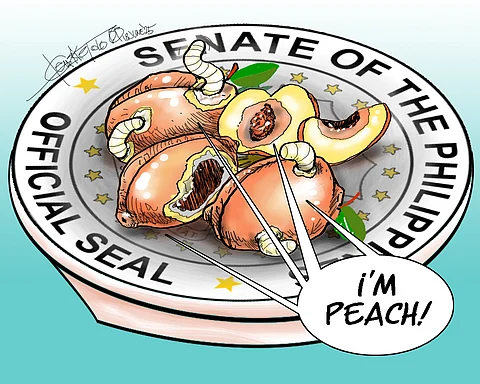
- NEWS
- the EDIT
- COMMENTARY
- BUSINESS
- LIFE
- SHOW
- ACTION
- GLOBAL GOALS
- SNAPS
- DYARYO TIRADA
- MORE

Even before the trial of the decade involving Vice President Sara Duterte could begin, the House of Representatives contingent has been exposed as lacking knowledge of court rules.
The House has assembled a prosecution team to prove the guilt of VP Duterte on the articles of impeachment.
Speaking as the impeachment court’s presiding officer, Senate President Francis Escudero had to remind the House counsels to respond formally and in unison and follow court rules.
The Senate impeachment court recently voted to remand the articles of impeachment. It directed the House to submit a certification that the complaint did not violate the one-year ban on impeachment, as well as a formal manifestation from the 20th Congress affirming its interest in pursuing the case.
The move has become fodder for a media spree by members of the House prosecution panel.
Reacting to a prosecutor saying that the court order to return the articles of impeachment was unclear, Escudero retorted that the statement should be made as a formal pleading.
An official communication done through a singular collective filing appears alien to the litigants.
While the impeachment process is both legal and political, the House contingent must possess a measure of legal expertise, which does not allow discourse through interviews, press releases, or social media posts.
“They can’t be responding one by one through interviews, expecting us to respond to each of them individually as well. We will only answer, if at all, any formal communication submitted through a pleading by the House prosecution panel representing the House of Representatives,” Escudero said.
Asked if a failure to comply would be considered defiance, Escudero said it would be up to the House, but legal experts have said that among the broad powers of the impeachment tribunal is to cite the House prosecutors and the contending parties in contempt.
The impeachment court will reconvene in the 20th Congress once the House and the respondent—Vice President Duterte — have submitted their respective responses.
The House, however, appears intent on defying the impeachment court after it filed a resolution in response to the Senate’s return of the complaint to them.
This was followed by press briefings and public pronouncements by the House prosecutors instead of filing a formal pleading.
Prosecutors like Gerville Luistro and Keith Flores have been all over the airwaves and the internet assailing the court’s remand order while asserting that the House had already complied with the constitutional requirements.
Had the comments been put in the legal document required of the prosecutors and submitted to the tribunal, they would have gotten the ball rolling.
The prosecutors have shown themselves to be more interested in a public spectacle than in proving their case.
The prosecutors must accept that the impeachment trial is a solemn constitutional process instead of a continuation of the Quadcomm inquisition or witch hunt.
The Senate, as an impeachment court, operates under strict rules, including time limits for arguments and a mandate to uphold legal substance over political rhetoric.
A conviction requires 16 of 23 senators, a steep goal for the prosecutors that demands airtight legal arguments and solid procedural integrity.
An acquittal, on the other hand, could fuel VP Duterte’s 2028 presidential bid.
The prosecutors should consider the Senate’s decision to return the articles of impeachment as an opportunity to prove the allegations against VP Duterte and hold her to account.
Before anything else, the loose cannons of the House must learn to observe the rules of the impeachment court.
